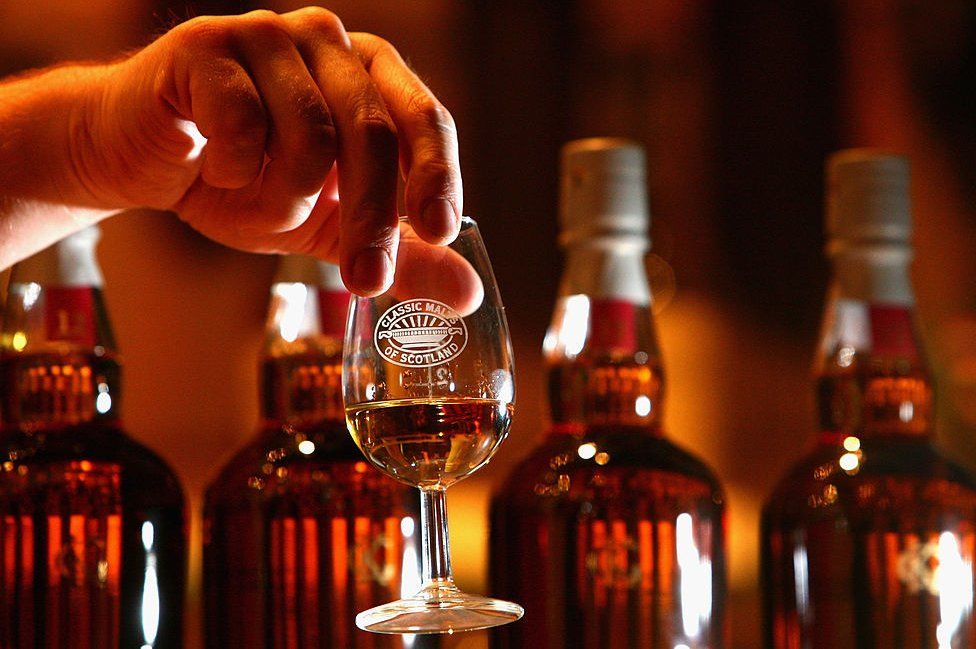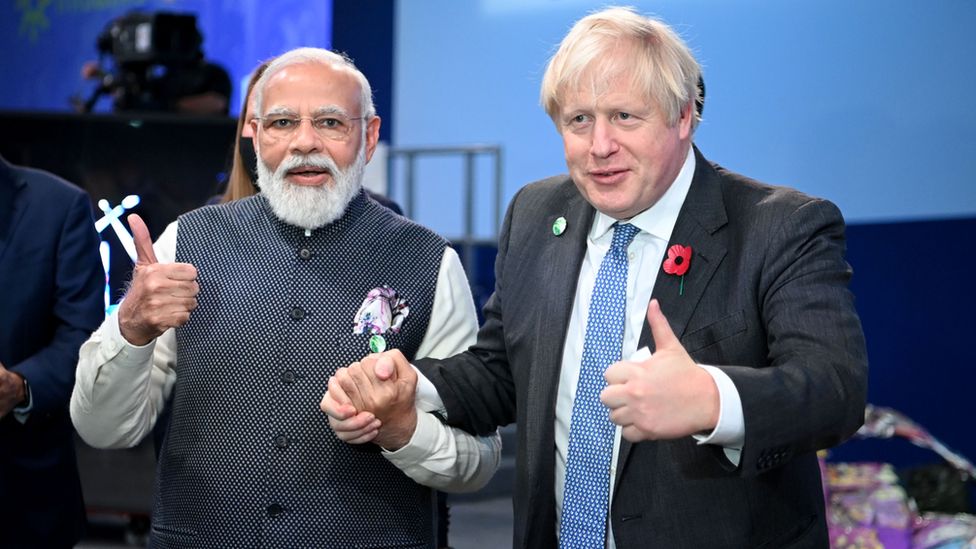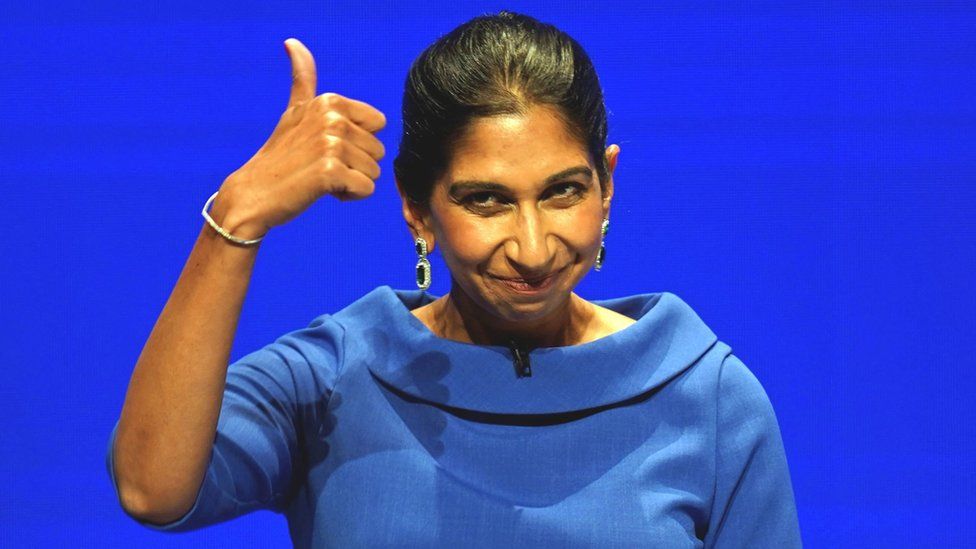
- Post-Brexit, one of the big prizes in UK trade talks would be a deal with India, and Scotch whisky could benefit most. A deal has been getting close.
- It is now in doubt because of comments by new Home Secretary Suella Braverman. Saying that Indians are over-staying their work permits strikes at the biggest gain that Delhi wants to see, and has caused offence.
Glenkinchie in East Lothian: the go-to Scotch whisky distillery for new secretaries of state for international trade who don't have time to visit Speyside or Islay.
With a new visitor centre as part of the Johnnie Walker branding, it offers nice media pictures with the copper stills, representing one of Scotland's and Britain's most successful exports.
Kemi Badenoch visited on Thursday, highlighting her department's gains from breaking through logjams in access to alcohol markets.
Welcome though it is for distillers to reduce tariffs and other barriers in Tunisia, Morocco, Argentina or Angola, the big prize for the industry is India - the world's biggest whisky-drinking market.
It has a 150% tariff on imports of Scotch, and bringing that down has been a key ask of New Delhi's trade negotiators from European trade commissioners and now, post-Brexit UK trade secretaries.
Their efforts haven't dented that tariff yet. India's domestic distillers like that level of tariff protection, though the biggest one, Diageo, also happens to be the company with most to gain from opening up the market for Scotch.
Understandably in any trade negotiations, India wants gains in return. Its big ask has been for easier access to the UK for Indians, with skills they can deploy in IT and far beyond, either with work permits or for intra-company transfers.
In a rush to ink trade deals and show that post-Brexit trade negotiations can deliver results, last April prime ministers Boris Johnson and Narendra Modi set a target deadline of the Diwali holiday, which is later this month, for an outline Free Trade Agreement (FTA). (To Hindus, this biggest festival of the year is to honour Lakshmi, the goddess of wealth and prosperity.)

That was an ambitious target. India is a formidable negotiator on trade. Brussels has found that talks tend to run into obstructions. A lot of people have a foot on the brakes. But the April announcement set the pace for some busy months of talking.
According to observers, there was a real prospect of a Diwali deal. The expectations of how widely the deal will range are being talked down. We're told it might be a work in progress, to which elements could be added. That sounds like a negotiating strategy that only aims for the easy gains, and any fall in the Scotch whisky tariff may turn out to be modest.
Speaking at the Glenkinchie distillery, Ms Badenoch said the Diwali deadline is definitely gone.
"We are close," the trade secretary said. "We're still working on a deal. One of the things that has changed is that we are no longer working to the Diwali deadline.
"We've closed a lot of chapters [the sections for the negotiating text]. The negotiations are progressing well. But we want to focus on the quality of the deal rather than the speed of the deal. Given the changes that have taken place - not just in government but the mourning period [for the Queen] and so on, it makes sense for us to focus on the deal rather than the day."
Two spanners have recently been thrown in the works. India has lodged an objection with the World Trade Organisation to Britain's protection of its steel industry. It has proposed measures in retaliation.
And then along came Suella Braverman, newly installed as home secretary. In charge of immigration policy, she told The Spectator magazine that she is concerned about Indians who come to the UK to work and then fail to return when their visas run out. She said Indian nationals are the most numerous offenders.
"I have concerns about having an open borders migration policy with India because I don't think that's what people voted for with Brexit… The largest group of people who overstay are Indian migrants. We even reached an agreement with the Indian government last year to encourage and facilitate better cooperation in this regard. It has not necessarily worked very well."
The comments have gone down very badly in India. The country's press is expressing its indignation that the home secretary should insult Indians that way.

"The British want Indian trade," says The Telegraph (of India). "But it doesn't want Indians."
"As countries that share a love for tea, India and Britain should perhaps read the tea leaves and hold off on a rushed deal that they might regret.
"India certainly might do well to be cautious about striking a pact with a British government that seems unclear about what it wants and that, if polls are to be believed, is largely unpopular. There is no point in signing a Diwali deal that might explode."
In the Deccan Herald, of Bengaluru, this "lashing out" at Indian immigrants comes "just when the UK and India are in the midst of finalising an FTA [and] has certainly muddied the waters and cast a shadow on the proposed deal that both sides had been hoping to sign by Diwali…
"[Liz] Truss would do well to realise that the proposed deal cannot be a one-way street. She will need to satisfactorily address New Delhi's expectations on migration and mobility for the FTA to come to fruition. To do so, the British PM may need to override her Home Secretary's reservations on immigration."
Asked about the spat, Kemi Badenoch brushed aside the Home Secretary's remarks, as if this former rival for the party leadership is of no relevance: "That's not the conversation that I'm having with my [Indian] counterpart. We're very much focussed on the content of the deal. The Home Secretary has a job to do, and she is making a comment on a much broader basis - it's not specifically to do with the FTA".
A deal "will happen soon," the international trade secretary told BBC Scotland. "But I don't want to give a date that is likely to change one way or the other, depending on what happens in the next phase of negotiations".
Trade negotiators in Brussels know that feeling. And just when you thought things couldn't be much worse for the Prime Minister, one of the brighter prospects for October is now disappearing into the distance.
"trade" - Google News
October 13, 2022 at 11:35PM
https://ift.tt/NOd2xZY
Scotching the trade deal with India? - BBC
"trade" - Google News
https://ift.tt/Ez4RSos
Tidak ada komentar:
Posting Komentar